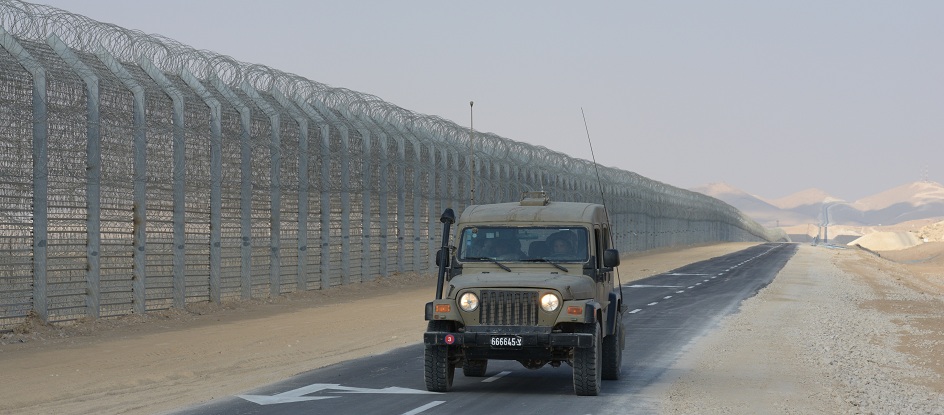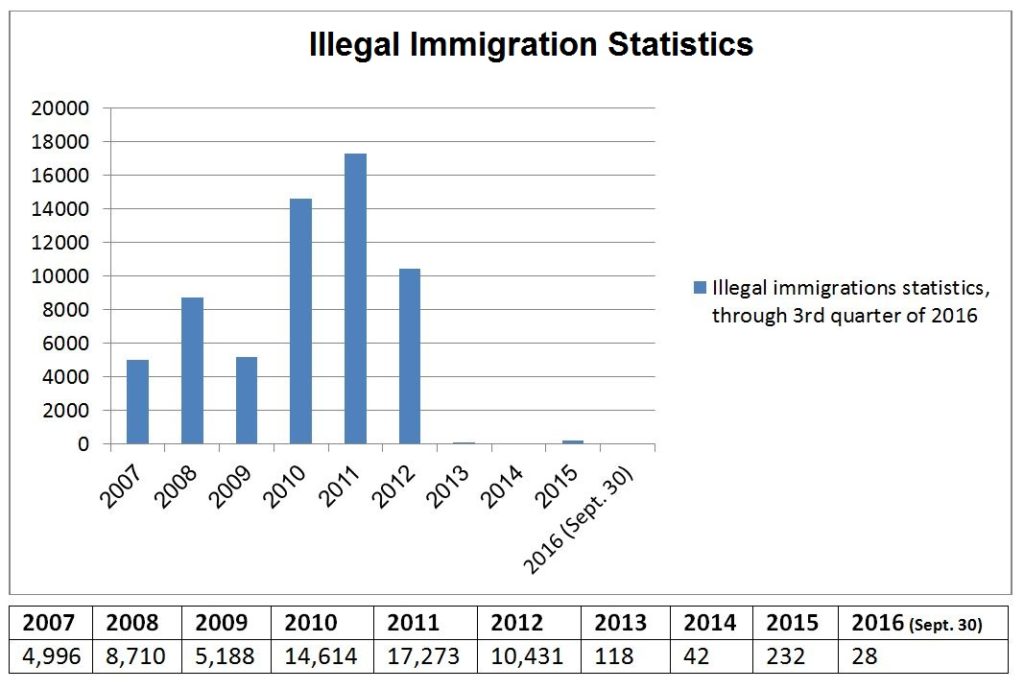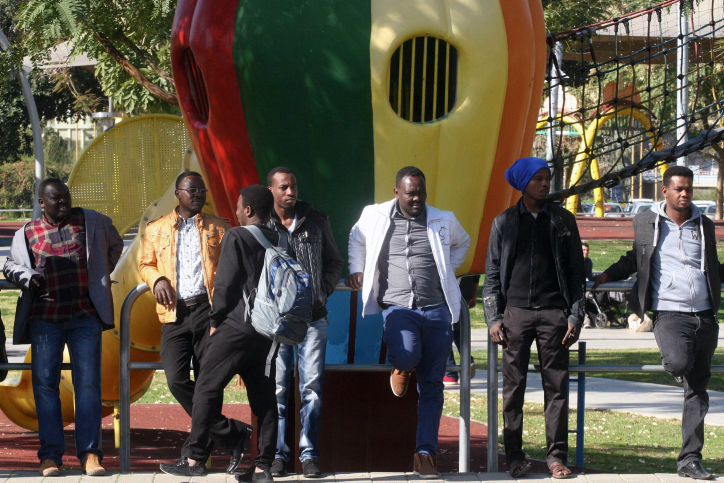The southern border fence helped curb illegal immigration, but it would not have been effective without incentive-reducing legislation

From the outset of his campaign, President Trump declared that if elected he would construct a wall along the southern border of the United States to stop illegal immigration. While his intention to build a wall has elicited support, it has also generated criticism pertaining to its effectiveness and justification. Those who support construction of the wall and its effectiveness cite Israel’s example as proof. On the surface, the drastic decrease in illegal immigration to Israel after the security fence’s construction supports this assertion. However, a closer look at the situation shows that there were other factors in reducing illegal immigration which were equally important.
Illegal immigration to Israel from Africa became a major problem beginning in 2007. Until then, approximately 2,700 illegal immigrants had entered Israel through the Egyptian border in the previous decades. Between the years 2007-2012, approximately 61,000 illegal immigrants entered Israel through the Egyptian border, the overwhelming majority coming from Eritrea and Sudan. The border fence was completed in December 2012 and the numbers of illegal immigrants dropped from 10,431 in 2012 to less than 150 in 2013. Furthermore, illegal immigrants entering between 2013-2016 were consistently lower than 150, only with a slight rise in 2015 to 232.
The correlation between these statistics and construction of the border fence indicate that the fence has successfully done the job. However, experts on the subject comment that the other Israeli actions were just as important.

A major problem
The problem of illegal immigration is not only an economic issue but it has also had a devastating effect on some Israeli communities.
Arik Greenstein, deputy editor for MIDA, has written extensively about the negative impact that illegal immigrants have had on south Tel Aviv residents. The influx of illegal immigrants has changed the fabric of what was once a tight knit, warm community. Many residents have moved due to fear and lawlessness. In addition, fear of rape, assault, theft and other crimes have made mundane activities, such as teens walking around after dark, or adults going for a morning jog, nonexistent. Some residents, unable to move due to old age or cost, have become prisoners in their own homes. In these old apartment buildings where residents have lived for decades, illegal immigrants have opened up whorehouses and pirate alcohol factories resulting in constant noise and disruption with no recourse for the buildings’ residents. Additionally, residents have seen their electric and water bills skyrocket, at times, due to makeshift pipes that illegal immigrants have connected to the outside of residents’ homes, thereby stealing electricity and water.
In a 2015 survey conducted for the Israeli police, only 38% of South Tel Aviv residents felt secure when outside their homes after nightfall, only 43% felt safe to even leave their homes at night, and the overall feeling of personal security in the area was 53%. The number of criminal acts reported to the police involving foreigners in Israel has risen since 2006 from 1,779 to approximately 2,600-3,500 cases each year between the years 2011-2015. Foreigners in Israel include not only illegal immigrants, but also foreign workers, tourists and Palestinians.
At the height of the illegal immigration in 2009, Assistant Commissioner [currently Commissioner] of Israel’s Prison Service, Ofra Klinger, published a comprehensive report on the issue, illustrating that the motivation for immigration from Africa was economic. She showed that immigration usually occurred when weather conditions allowed for extensive walking through the Sinai desert, and that more than 80% of those who immigrated were men above the age of 18, who migrated without their family. This latter fact supports the claim that those migrating were not refugees fleeing for their lives, but rather individuals seeking work in Israel, who hoped to eventually bring their family to Israel after earning enough money. Klinger also claimed that building a fence would not be enough, and that the State of Israel had to create conditions which would make illegal immigration less attractive. These included ceasing to grant work permits to foreign workers, thus making it more difficult for illegal immigrants to receive healthcare and permanent status.
Klinger’s claim was supported by Yochi Gnessin, the senior state lawyer working on illegal immigrant issues. She explained:
Until 2007, the State of Israel did not grant work permits for illegal immigrants. In 2007, without consent of the government and in defiance of its decision, 2,200 work permits were granted to illegal immigrants to work in Eilat hotels, and after that another few hundred were granted, again in defiance of the government. Subsequently, the amount of illegal migrants increased threefold. The stats are clear, when Israel grants work permits to illegal migrants, it increases the flow.
Furthermore, Gnessin mentioned that it has been a combination of legislation, amendments and a border fence which has successfully curbed illegal immigration.

Solving the Problem
The border fence spanning along the Egyptian border is approximately 153 miles long. The northern part of the fence begins in the area of Israel’s border with Gaza, and reaches Eilat in the south. This part of the fence was finished in December 2012 at a cost of roughly $370 million. The last 10 miles of the fence, situated in a mountainous area in Eilat, was completed a year later in December 2013 at an additional cost of roughly $52 million. The height of the fence in most areas is 16.5 feet, but in a specific area, ranging about 10 miles, the fence was raised to a height of 26 feet after some groups of illegal immigrants succeeded in crossing above the fence in 2015. This adjustment to the fence was finished in January 2017.
In addition to the fence, new legislation and amendments to existing legislation have been implemented to curb illegal immigration and provide incentives to illegal immigrants residing in Israel to leave. One law, passed in 2013, prevents illegal immigrants from transferring remittances out of the country, however, this is difficult to enforce. A new and innovative law, initiated by a local NGO, the ‘Israeli Immigration Policy Center’ (IIPC), and passed by the Knesset, requires employers of illegal immigrants to deposit 20 percent of their salary in a government fund, which illegal immigrants can only retrieve upon departing from Israel. Before these laws were passed, illegal immigrants would often send money to their family members in Africa who used that money to pay agents to assist them in reaching and illegally entering Israel. Another measure offers illegal immigrants $3,500 cash and a [one-way] plane ticket to leave Israel to their homeland or to another country.
Amendments to the current ‘Anti Infiltration Law’ include allowing the government to hold illegal immigrants in administrative detention for up to three months in a closed detention center and up to twelve months in an open detention center, where they are required to sign in daily. However, in these detainment centers, the Israeli government still supplies basic services such as room and board, education, social workers/psychologists and basic health services. Israel does not cover illegal immigrants under the national health insurance law, nor does the Welfare Ministry grant them most services given to Israeli citizens. These policies and amendments are geared to discourage illegal immigrants from attempting to enter Israel, and to prevent conditions that will facilitate illegal immigrants currently in Israel from settling in Israel.
Yonatan Jakubowicz, public relations director at the IIPC, points out that a closer look at the statistics shows that implementation of the ‘Anti Infiltration Law’, beginning at the end of May 2012, played a significant role in reducing the number of illegal immigrants infiltrating the country. “Out of the 10,431 entries in 2012, 9,036 entered through the end of June, whereas in the second half of the year only 1,400, a near 85% drop. This decrease in the second half of 2012 occurred even though the fence had not yet been completed along the main infiltration routes, which was only completed in December, 2012.” Since 2013, 14,500 illegal immigrants have left Israel on their own volition, but there still remain 41,000, not including children that have been born to Eritrean parents while in Israel.
Thus, as seen, Israel has applied a three prong approach to curbing illegal immigration from Africa. The border fence was constructed to make entering Israel as difficult as possible, and allow authorities to catch those attempting to infiltrate. Second, Israel has implemented legislation geared towards discouraging potential illegal immigrants from paying large sums of money and risking their lives to reach Israel. Third, for illegal immigrants currently in Israel, the government has implemented laws which make it difficult for them to become permanent residents and access services granted to citizens, as well as not allowing them to transfer their savings out of the country and the government withholding access to part of their salary unless they leave.
_______
Gideon Israel is co-head of the Jerusalem Washington Center and can be contacted at Gisrael@jw-center.org






Awesome review of the sad past and unfinished present of the infiltrators. We hope this article will assist the Trump Administration and sane European countries in controlling their own borders.
I'd like to highlight that nearly all of the infiltrators were male and Mohammadens. This was a hijra.
Liberals are too often ahead of conservatives, facilitating and explicitly encouraging an invasion they wanted to use to further alter and distort Israeli culture for their own self-immolating, self-loathing agenda.
Israel is weak and wandering, because it has not yet deported the remaining 41,000 lawbreaking hijra jihadists. Instead, they are a dangerous, lawbreaking, violent underclass who, along with their children, may be on the way to voting rights.
The infiltrators have literally and thoroughly destroyed entire communities in Israel, naturally among the poorest and most vulnerable. It is to the shame of Israel's citizenry (the same citizenry that let Sderot get bombed nearly daily for ten years) and to it's self-centered political leadership that this was allowed to happen.
The border fence is worthless without the legislation measures that make it unworthily to infiltrate.
In the past (pre-border fence), border patrol used to shoot on suspected border infiltrators, and return the ones being caught to the Egyptian authorities, all in accordance with the Egypt-Israel peace treaty. Unfortunately, the high justice cort intervened and did not allow to return the infiltrators being caught to the Egyptian authorities, therefore making the border patrol useless.
Both replies above make excellent points. I hope Trump takes time to ask Netinyahu about his 3 prong approach which is working well in Israel. I am all for a wall here in the U.S., but that is not enough. We need to add strong additional deterrents. One, we should make it a criminal and civil offense to hire undocumented workers (this would work much better than a wall). Two, make it illegal for illegal aliens to send money home, and confiscate the money when known. Three, we should punish illegals who have bring children or have additional children while in our country. We have to get tougher[much tougher] because our lives are at stake, but it is probably too late here in the U.S.